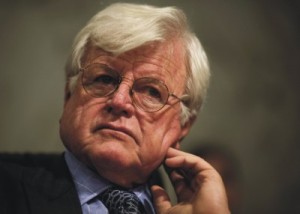It has been said that:
“Story is the most natural way of enlarging and deepening our sense of reality, and then enlisting us as participants in it. Stories open doors to areas or aspects of life that we didn’t know were there, or had quit noticing out of over-familiarity, or supposed were out of bounds to us. They then welcome us in. Stories are verbal acts of hospitality.” (1)
Growing up, our family had a black and white television. I vividly recall watching the evening news most week nights with my dad. Some of my earliest, most formative memories came from those newscasts — images of the injustice and violence during the civil rights movement — the hateful attitudes and nasty dialogue that provided me with a sense that my country had some challenges it was wrestling desperately with. I’ll never forget sometime during the spring of 1963 when our television pumped out the images and sounds of the violence that occurred during the march(es) and protests in Birmingham, Alabama — where student protesters were beaten by the police with billy clubs, knocked down by fire hoses, and savagely attacked by German Shepherd police dogs. I was scared. I asked my dad if that kind of stuff was going to happen in our neighborhood. His attention was riveted on the TV set and didn’t respond.
Images of a country named Vietnam came into our living room. I began to hear strange terms like agent orange, nigger, George Wallace, the Ku Klux Klan, protests, marches, non-violence, Dr. King, desegregation, civil rights, racism, equal rights, riots, astronaut John Glenn, The Peace Corp., congress, congressional hearings and legislation.
In November 1963, I had just turned nine years old. My dad was Catholic. He never attended mass because he had gone through a divorce and was not allowed to participate in the faith of his upbringing. My dad thought it some sort of a miracle that a young, Irish-Catholic could be elected to the office of President of the United States. He was proud of our country for electing John F. Kennedy to this office. Dad said it was “another great chapter in the unfolding of the American dream.” I had no idea what he meant.
That day in November 1963 when JFK was assassinated, my nine year old life blew seemingly apart. Both my parents were sobbing, crying and angry. This went on for a week or so. It was a nightmare for a nine year-old kid.
During this time, something remarkable happened to me. I mustered the courage to grab a pencil and paper and go to my room. I wrote a poem about JFK. It was the first time in my life that my soul screamed for expression via the written word. When I was done, I was scared. I didn’t know what to do. I decided to share it with my mom. She wept at my words then hugged me and told me how beautiful those words were – “spoken from your heart,” she said.
About ten days later, that poem ended up in my grade school teacher’s hands. She read it to my class. At the end she said, “by Bill Dahl.” I turned purple and wanted to disappear, as my classmates turned their gaze upon me. The teacher began to clap and so did my classmates. A few had visible tears in their eyes. I felt relieved, yet uneasy. It’s like someone revealed a part of my soul without my permission. Another thing happened that day — I was bestowed with the courage to learn to write and speak about issues that concerned me, and share them with others.
Today, I recognize the impact the Kennedy brothers have had on my life — an enduring, positive contribution indeed. Whether you agreed with their positions on the issues that have confronted this country throughout their years is frankly, immaterial now. Those contributions are woven very carefully and intricately into the fabric of this nation, providing the renewal of a dream, inclusion, participation, comfort and hope for millions who would exist without the same, had it not been for their leadership, vision and unswerving dedication to public service.
Today is a day to say thank you to Teddy. Today, I express in writing, my most heartfelt thanks for the Kennedy contribution in my life, and in my country.
Teddy – A distinguished public servant who dedicated his life to advocating for the poor, disabled, women’s rights, refugees, immigrants and the politically disadvantaged. His signature is indelibly imprinted on the soul of this nation regarding many other issues including health care, education, civil and human rights, campaign-finance reform and labor law. He steadfastly opposed war, yet battled tirelessly throughout his career, on many fronts, in the U.S. Senate.
We have a lot of work yet to be done, as characterized in what has become a few of Teddy’s most poignant words:
“There is a new wave of change all around us, and if we set our compass true, we will reach our destination — not merely victory for our Party but renewal for our nation. This November the torch will be passed again to a new generation of Americans. The work begins anew. The hope rises again. And the dream lives on.”
Senator Edward M. Kennedy
August 25, 2008
Denver, CO
Hold your torch high! Rise again with hope. Let’s work together to make this ever unfolding American dream live on and become a reality for millions more.
Notes:
(1) Peterson, Eugene Christ Plays in Ten Thousand Places – A Conversation in Spiritual Theology, Wm. B. Eerdsman Publishing Company, Grand Rapids, MI Copyright © 2005 by Eugene H. Peterson, p. 13.



